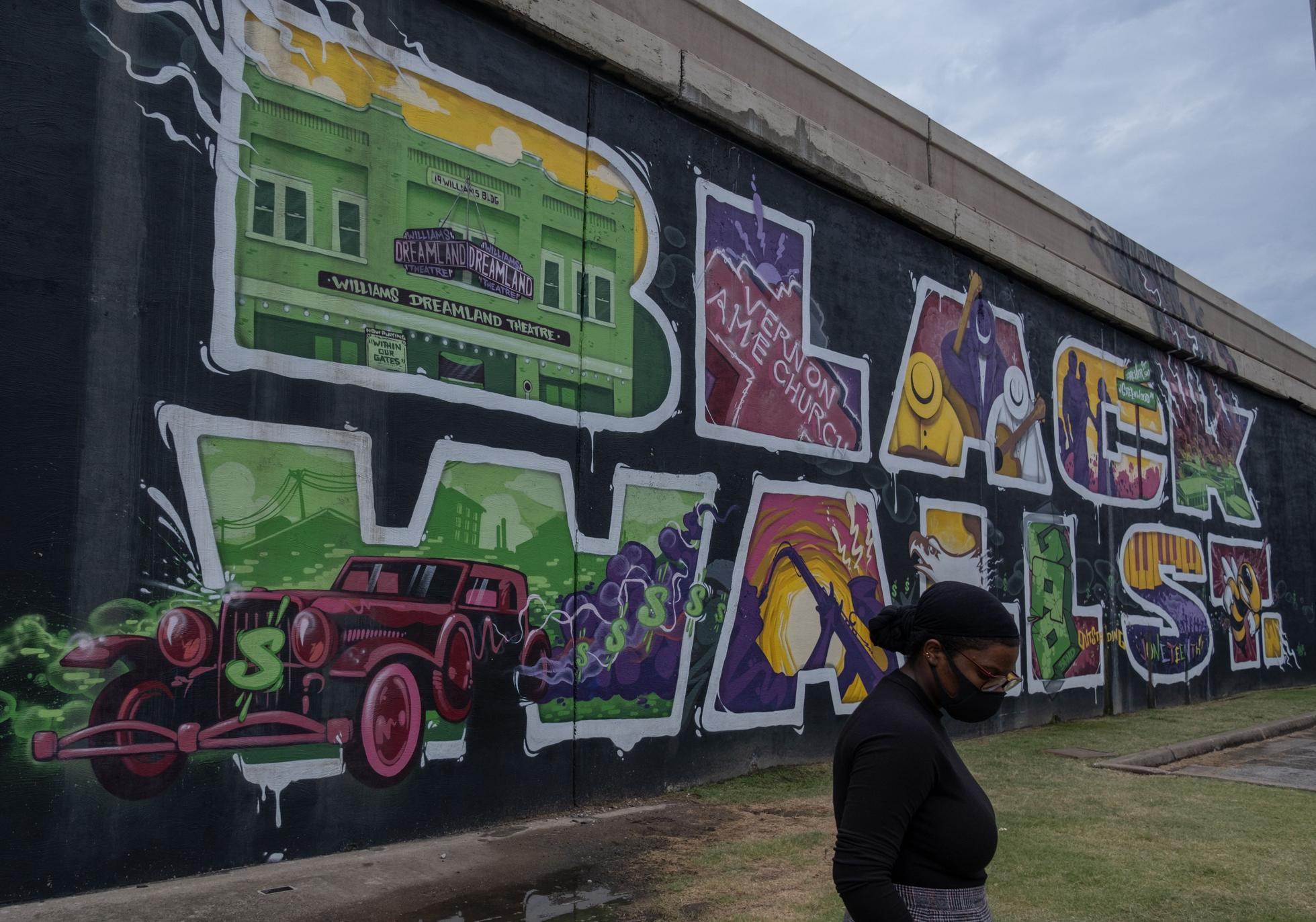
A "Black Wall Street" mural in the Greenwood district of Tulsa.
SETH HERALD/AFP via Getty ImagesOne hundred years ago, a dollar would change hands 30 to 100 times in the Greenwood District of Tulsa, Oklahoma—moving from the till of one thriving business to another. That all came to an end on May 31, 1921, when a white mob descended on the community and killed over 200 of its Black residents and caused $50-million worth of damages to its luxury hotels, apartment buildings, schools, theaters, banks and other Black-owned businesses.
Today, in the 40-square blocks of what O.W. Gurley once coined “Black Wall Street,” there’s been a resurgence of Black businesses and a revival of Black entrepreneurial spirit. Here, we highlight a few of the businesses carrying the torch. They represent the city’s renewed focus on building Black culture while creating prosperity and fueling what could become Tulsa’s second boom.
Fulton Street Books and Coffee
When former educator Onikah Asamoa-Caesar opened Fulton Street Books and Coffee in July 2020, she wanted it to be a place where residents could congregate to exchange ideas, learn and celebrate Greenwood’s legacy. “The beautiful thing about Fulton Street is that we’re able to build a space that allows people of color to walk in and have this sense of, ‘Someone thought of me when they built this,” Asamoa-Caesar says.
Nearly one year later, it’s become just that. Amid the racial tension and economic uncertainty that stemmed from the pandemic, Asamoa-Caesar’s shop offered critical race, gender and historical readings and a book subscription service to encourage allyship through reading. According to Asamoa-Caesar, it’s all about creating a space that conveys respect and dignity.
Silhouette Sneakers and Art
In 1921, Greenwood wasn’t just the center of Tulsa’s Black economy, but of its Black culture. Venita Cooper brings a piece of that back with her sneaker shop-gallery, which combines art, fashion, commerce—and a lot of sneaker culture.
Cooper, a self-professed sneakerhead, says that when you enter her store, “you are going to be a full participant in that culture ... in that market.” It’s a market that Cowen Equity Research has estimated to be worth $6 billion worldwide.
Cooper’s entrepreneurial prowess lies in her ability to both understand and monetize not just sneakers, but sneaker culture. Silhouette sells coveted kicks like Adidas Yeezy 500 Bone White ($440), New Balance 2002R Salehe Bembury ($340) and Jordan 1 Retro High White University Blue Black ($500). The gallery features works by standout young artists such as “Black Cowboy” and music by Tulsa-based rappers like 1st Verse.
Outside her brick-and-mortar store, Cooper discusses the artistic processes and aspirations of venerable streetwear figures, musicians and photographers on her podcast, 20 on Da Town.
Still She Rises
On the same streets where Black blood was shed, Still She Rises Tulsa was launched to create the nation’s first public defender office dedicated exclusively to representing mothers targeted by the criminal justice system. In Oklahoma, the incarceration rate for women is higher than any other state according to a 2019 report by the Vera Institute of Justice. Moreover, Black women make up a disproportionate number of those incarcerated.
Now under the leadership of Aisha McWeay, a public defender who spent the past decade in Nashville’s Public Defender’s Office, Still She Rises has become an independent nonprofit organization so that those who cannot afford an attorney can receive legal representation. Of her staunch commitment to the people of Tulsa and her belief in the idea that real legal reform is on the way, McWeay has said, “Reform to the legal system is not a headline or hot topic for me, it’s a commitment.”
The Black Wall Street Times
Now more than ever, the voices of Black people need to be heard.
That’s why Greenwood native Nehemiah Frank created The Black Wall Street Times. But Frank, who is both founder and editor-in-chief, was not the first Black Greenwood resident to launch and run a newspaper.
Before white mobs destroyed the district, there was another Black newspaper in town: the Daily Tulsa Star. Founded by A.J. Smitherman, who moved to Tulsa in 1913, the newspaper published until the race riot began on June 1, 1921.
Though Frank doesn’t have a background in media (he is an educator and policy advocate), he has gained recognition as a stand-out Black journalist in an industry increasingly called to task for its lack of Black representation.



















